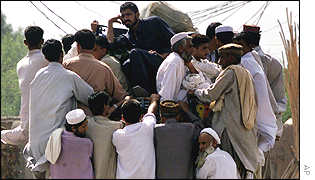

The envoys have gone to Kandahar in the south of the country for a meeting with the Taleban's reclusive leader Mullah Mohammad Omar.
The Afghan rulers have already warned that they might attack any country that offers assistance to the United States.
The Pakistani army captain also said that Islamabad had reinforced its troops along the frontier with Afghanistan.
UN officials meanwhile said that tens of thousands of Afghans, fearing US strikes, were streaming out of cities - including up to half the population of Kandahar - and heading towards the borders with Pakistan and Iran.
Pakistani Foreign Minister Abdul Sattar on Monday confirmed the urgency of the talks with the Taleban.
"Time is of the essence. There is no ultimatum, but time is definitely running out," Mr Sattar said.
Latest reports from the meeting say talks have broken up but are due to resume later.
In a BBC interview, Pakistani Foreign Minister Abdul Sattar said the Taleban have been told of the urgency of the situation.

Pakistan's decision to support Washington has
prompted protests from hardline Islamic groups.
Pakistan and Iran, which already shelter millions of Afghan refugees from drought and civil war, have moved to shut their borders with Afghanistan as thousands flee in fear of US strikes.
Click here to see map of Afghanistan
BBC correspondent Adam Mynott, reporting from Torkham, one of the main crossing points at the head of the Khyber Pass in the North-West Frontier Province, said the situation was extremely tense.
Other neighbouring countries such as Tajikistan also fear a new flood of refugees from northern Afghanistan.
Flights ban
Kris Janowski, a spokesman for the Geneva-based UN High Commissioner for Refugees (UNHCR) said: "Kandahar is half empty.
"People are fleeing Kabul and Jalalbad for the countryside."
The last Western aid workers left Afghanistan on Sunday, one day after the ruling Taleban militia ordered them out of the country, saying they could not guarantee their safety.
The UN has warned that if they cannot continue their work inside
Afghanistan, up to 1.5 million people could be forced to leave their homes to
avoid starvation due to the continuing drought.
The Taleban, meanwhile, shut down Afghanistan's airspace on Monday.
An estimated 110 flights that cross Afghanistan every day will now have to make an expensive diversion.
Afghanistan had already been moving in this direction, warning two weeks ago that it might shut down the airspace if UN sanctions were not lifted.
Bin Laden denial
Mr Bin Laden on Sunday issued his first personal denial of involvement in the attacks.
"The US is pointing the finger at me but I categorically state that I have not done this," he said in a statement faxed to the Pakistan-based Afghan Islamic Press (AIP) news agency.
The opposition alliance to the Taleban, which has been pushed back into the north of Afghanistan, has said it could provide invaluable help in hunting down Mr Bin Laden.
Burhanuddin Rabbani, the ousted Afghan president, told the BBC his fighters were well acquainted with the hostile terrain, which has long been seen as a real obstacle to any foreign army trying to move in the country.

Related to this story:
Aid
agencies warn of Afghan crisis (14 Sep 01 | South Asia) Taleban
tense as US seeks targets (12 Sep 01 | South Asia) Bin
Laden's command structure (14 Sep 01 | Americas) Bin
Laden divides Arab opinion (16 Sep 01 | Middle East) Iran
weighs up its options (16 Sep 01 | Middle East) Pakistan
'will comply' on terror (15 Sep 01 | South Asia) Who
is Osama Bin Laden? (11 Sep 01 | South Asia) More
arrests in US terror probe (17 Sep 01 | Americas) In
pictures: Afghans fear US backlash (16 Sep 01 | South Asia)